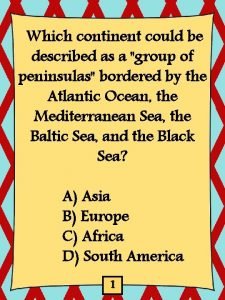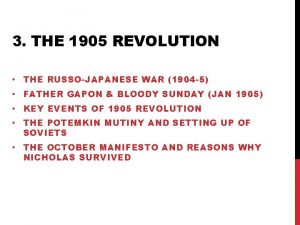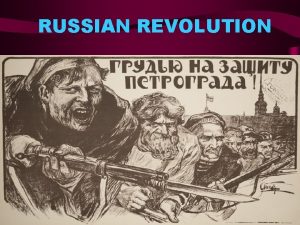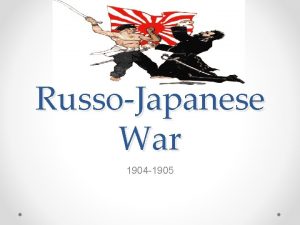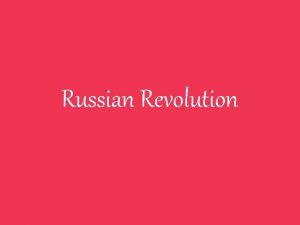THE RUSSIAN REVOLUTION RUSSOJAPANESE WAR 1904 1905 Russia





- Slides: 5

THE RUSSIAN REVOLUTION

RUSSO-JAPANESE WAR (1904 -1905) • Russia had established a sphere of influence in Manchuria and sought Korea. • Korea had just been acquired by Japan • Russia wanted to build a railroad through Manchuria to Vladivostok on the Pacific Ocean • Russia is defeated • Cause for the Revolution of 1905 • The Russian government turned its attention way from Asia and focused on expanding into the Balkans

REVOLUTION OF 1905 • Liberalism had gradually grown in certain segments of the Russian population over the previous 50 years • A professional middle class emerged due to increased educational opportunities, increased gov’t jobs, and industrial development • Poor economy and strains of war led peasants, the growing urban proletariat, and the middle class to demand reforms • “Bloody Sunday”- January 1905 • 200, 000 workers and peasants marched peacefully to the winter palace asking the tsar for reforms • Tsar was not in town • Army fired on marchers in cold blood, killing about 300 and wounding an additional 1000 • A general strike, peasant revolts and troop mutinies paralyzed Russia by October • The October manifesto of 1905 created the Duma (national assembly)

THE DUMA • • Representatives elected by universal male suffrage Granted freedom of speech, assembly, and press Tsar retained absolute veto Nicholas II dissolved the duma twice in 1906 • Due to reforms sought by some members of the duma (less power for the tsar, give noble lands to peasants) • The government used oppression to rid out any opposition • (political executions, German, Russian, and Polish property owners attacked, Jews were persecuted)

RISE OF SOCIALISM IN RUSSIA • 1898 - Social Democratic Worker’s party founded in Minsk • Vladimir Lenin was the leader (later exiled to Switzerland) • Three ideas central to Lenin’s philosophy • Capitalism could only be destroyed by violent revolution • Socialist revolution was possible under certain conditions • Necessity of a highly discipline workers’ party, strictly controlled by a dedicated elite of intellectuals and full-time revolutionaries • 1903 Social Democrats split into two factions • Mensheviks- (minority) sought more democratic party with mass membership • Bolsheviks (majority) followed Lenin’s philosophy





